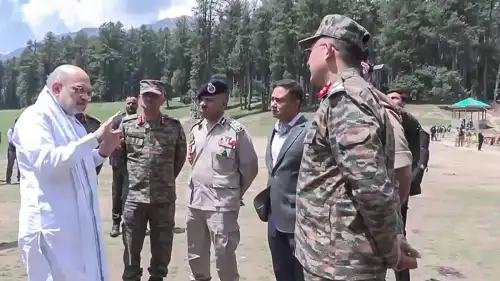Operation Sindoor: Amit Shah’s Response to Brutal Killings in Pahalgam

Operation Sindoor: Bharat’s Firm Response to Pahalgam Killings
In a significant escalation of regional tensions, India launched “Operation Sindoor,” a series of targeted military strikes on nine locations across Pakistan and Pakistan-administered Kashmir. This operation directly responded to the brutal terrorist attack in Pahalgam, Jammu and Kashmir, on April 22, 2025, which killed 26 Indian tourists. The Indian government attributed the attack to Pakistan-based terrorist groups, including Lashkar-e-Taiba (LeT) and Jaish-e-Mohammed (JeM).
The Pahalgam Attack: A Tragic Incident
The Pahalgam attack began when militants opened fire on a group of tourists at Baisaran, a popular hilltop destination. The assailants mingled with the crowd before launching the assault, causing widespread panic and chaos. Among the victims, many hailed from various Indian states, including Arunachal Pradesh, Karnataka, Kerala, Maharashtra, Odisha, Gujarat, Haryana, Tamil Nadu, Uttar Pradesh, and West Bengal. The dead included three Indian government officials: recently married officers from the Indian Air Force and Indian Navy, and an official from the Intelligence Bureau. One Christian victim was a resident of Madhya Pradesh.
India’s Retaliatory Measures: Operation Sindoor
In response to the attack, India initiated Operation Sindoor, involving missile and drone strikes targeting nine sites within Pakistan. The Indian government claims these sites had ties to terrorist infrastructure associated with LeT and JeM. The strikes killed at least 26 individuals, including children, and injured 46. Pakistan condemned the strikes, calling them violations of its sovereignty, and vowed retaliatory actions.
Pakistan’s Response and Escalation
Pakistan labeled India’s actions a “blatant act of war” and a violation of its sovereignty. In retaliation, Pakistan claimed to have downed several Indian jets and authorized “corresponding actions.” Heavy artillery shelling occurred along the Line of Control (LoC), affecting civilians on both sides. At least 12 Indian and 5 Pakistani civilians died in the exchanges.
International Reactions
The international community expressed concern over the escalating tensions between the two nuclear-armed neighbors. The United Nations, China, Russia, and Western countries urged both India and Pakistan to exercise restraint and engage in dialogue to prevent further escalation. Flights across the region were disrupted due to safety concerns.
Domestic Repercussions in Kashmir
Following the Pahalgam attack, India implemented a sweeping crackdown in Kashmir, detaining over 2,000 residents under anti-terrorism laws. Many detainees, including those with no known ties to militancy, reported being beaten and interrogated without cause. Authorities also demolished homes of alleged militants’ families, despite a Supreme Court ruling deeming such demolitions illegal. This displaced numerous innocent families and caused extensive collateral damage. Residents described the situation as a “living hell” and feared these measures would further alienate the local population.
Conclusion
Operation Sindoor marks a significant development in the ongoing conflict between India and Pakistan. While India asserts its right to self-defense and counter-terrorism operations, Pakistan views the strikes as an infringement on its sovereignty and has pledged to retaliate. The international community continues to monitor the situation closely, urging both nations to de-escalate tensions and pursue diplomatic solutions to avoid further loss of life and regional instability.






